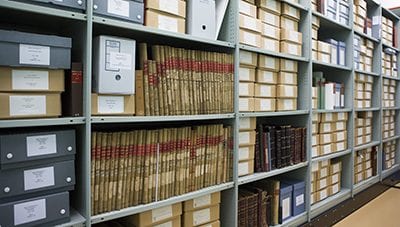
Finding the letters of a local poet, files about fluoridation or information about an obscure official employed by the Western Pacific High Commission is now much easier thanks to the new Manuscripts and Archives catalogue.
Manuscripts and Archives is a catalogue of the processed archival material in Special Collections, the Architecture Archive and Fine Arts. It improves discovery by combining information about these rich and varied archival collections into one searchable catalogue, replacing the need to search individual finding aids. You can now keyword-search across nearly 1,100 archival collections, encompassing 139,000 archival records, 1700 subject terms and 2800 creators’ names.
That means that files on subjects such as fluoridation, which may be held in several collections, including the papers of a midwife or the records of a political party, are now found through a single search.
 Manuscripts and Archives allows you to:
Manuscripts and Archives allows you to:
- Search across archival collections.
- Browse collections.
- Refine your search.
- Use filters and facets.
- Sort results and see the hierarchical arrangement of the material within collections.
- Generate citations and finding aids, if required.
Researchers who helped trial Manuscripts and Archives were enthusiastic about the way it opened up the archives, exposing a wide range of potentially relevant material and allowing complex searches that were not previously possible.
There are several ways to access Manuscripts and Archives:
- Use Search Everything and from all results, select the results labelled ‘Archives’.
- From the Search Everything drop-down list, select ‘Archives’ to carry out a faceted search.
- From the homepage top Library menu, select ‘Manuscripts and Archives’.
- Save the URL for quick access.
The process for requesting access to the actual material is unchanged. We recommend contacting the relevant repository in advance to make arrangements.
For help or further information about using Manuscripts and Archives, please email specialcollections@auckland.ac.nz
Katherine Pawley and Stephen Innes, Special Collections
